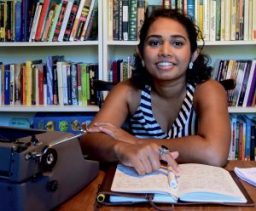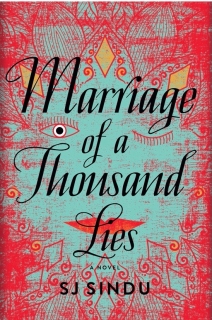 When I talk about music I listen to during writing, I’m really talking about two things—the music I put on while I’m physically writing at my desk, and the music I listen to for the duration of a project. In other words, there’s the writing music, and then there’s the other music—the stuff I listen to while driving, cooking, exercising, and dancing with my partner. The first kind I call sustenance music; the second, inspirational. Both shape my writing process and voice.
When I talk about music I listen to during writing, I’m really talking about two things—the music I put on while I’m physically writing at my desk, and the music I listen to for the duration of a project. In other words, there’s the writing music, and then there’s the other music—the stuff I listen to while driving, cooking, exercising, and dancing with my partner. The first kind I call sustenance music; the second, inspirational. Both shape my writing process and voice.
My novel, Marriage of a Thousand Lies, began with a Coyote Grace number called “Forever’s Song.” I started with images produced by these lyrics:
This life ain’t going no one’s way
Sweet Goddess, she’s gonna do what she do
Miss fickle rolls with God in the hay
And leaves him sleeping under the moon
The harvest is done and she ain’t coming back till June
In these lyrics are images of autumn, and a strong woman who has little use for a man. These images turned into a short story about a young South Asian American woman who runs away from home. But the story grew and grew, and pretty soon I was writing about the woman’s sister, the kindred spirit she leaves behind, the one who dreams of escaping but is too bound to her family. This is how I met Lucky, the protagonist of Marriage of a Thousand Lies.
 All through the writing of this novel, I listened to Coyote Grace and Chris Pureka on repeat. Coyote Grace is an indie roots band made up of Joe Stevens (guitar and vocals), Ingrid Elizabeth (cello and vocals), and Michael Connolly. The band is trying to reinvent and bring a radical progressive perspective to roots music. In their work, Coyote Grace often explores queer sexuality and gender transition with nuance and insight. Chris Pureka is a guitarist and vocalist whose work is inspired by bluegrass and folk music. Like Coyote Grace, she also explores queerness and gender in her music.
All through the writing of this novel, I listened to Coyote Grace and Chris Pureka on repeat. Coyote Grace is an indie roots band made up of Joe Stevens (guitar and vocals), Ingrid Elizabeth (cello and vocals), and Michael Connolly. The band is trying to reinvent and bring a radical progressive perspective to roots music. In their work, Coyote Grace often explores queer sexuality and gender transition with nuance and insight. Chris Pureka is a guitarist and vocalist whose work is inspired by bluegrass and folk music. Like Coyote Grace, she also explores queerness and gender in her music.
Where Coyote Grace brought me inspiration with their poetic lyrics, Chris Pureka brought me sustenance. There’s a hypnotic quality to Pureka’s music and voice that helped me into the writer’s trance. I can’t help but think of her when I think about my protagonist Lucky’s internal mindspace—alternatively zen and energetic melodies that simmer over a painful, roiling interior.
But the actual rhythm of Lucky’s voice was inspired by Bharatanatyam beats. Lucky’s passion in the novel is dance—specifically, an Indian classical form called Bharatanatyam, which she and her lover Nisha have danced since they were little. Their whole relationship is based around this dancing, and Lucky muses on it often.
When I met Tony Amato, an author and writing coach in Boston, he offered to read the novel in its mid-stages. I remember meeting with him in his study in Somerville to discuss the manuscript. I sat curled in an armchair with Tony’s ancient cat on my lap and a cup of coffee (which I’d defiled, as Tony called it, with sugar and cream). We talked about a lot of things, but my most vivid memory of that afternoon was when Tony turned to me and asked why the voice wasn’t taking its cues from Bharatanatyam. It was one of those lightning-strikes moments.
I went home and started listening to Bharatanatyam songs. Bharatanatyam music is normally headlined by a miruthangam—a double-sided drum that produces a large variety of tones. The thaalam (rhythm) of the beat can be slow or fast, but may sound chaotic to an untrained ear. There is also a certain amount of improvisation. The central thaalam forms the foundation of the music (which often has accompaniment from vocalists, violins, and other instruments). And for my protagonist Lucky, who was trained in Bharatanatyam from the time she was little, it makes sense to me that part of her internal music would be formed by a foundation of this same thaalam.
 I compiled a list of traditional melodies, and re-wrote every single line of the novel with those beats in the background. A lot of things fell into place—Lucky’s voice, her personality, her longing. All the things that seemed barely in my grasp before came into clear focus. If you read closely, you can hear the thaam thakka tham of a miruthangam in the cadence of the novel, but ultimately that’s not the point. The point is to infuse the book with the music that rules Lucky’s life. Without this music, Lucky’s interiority would’ve never fully developed.
I compiled a list of traditional melodies, and re-wrote every single line of the novel with those beats in the background. A lot of things fell into place—Lucky’s voice, her personality, her longing. All the things that seemed barely in my grasp before came into clear focus. If you read closely, you can hear the thaam thakka tham of a miruthangam in the cadence of the novel, but ultimately that’s not the point. The point is to infuse the book with the music that rules Lucky’s life. Without this music, Lucky’s interiority would’ve never fully developed.
Now, as I work on a new novel, I’m always thinking about inspirational and sustenance music. There’s a lot of jazz, Fleet Foxes, and Ravi Shankar in my life right now, and I can see those beats and codas working their way into the voice of my current novel project. Of course, the process of writing transforms this music, just as the music transforms the writing. It’s a beautiful, wild cycle.
SJ Sindu was born in Sri Lanka and raised in Massachusetts. She was a 2013 Lambda Literary Fellow. She holds a PhD in Creative Writing from Florida State University. Her work has be published in Brevity, the Los Angeles Review of Books, The Normal School, Fifth Wednesday Journal, and other journals and anthologies. She teaches and writes in Tallahassee. Marriage of a Thousand Lies, her first novel, is out now by Soho Press.
For original poetry, fiction, art song and art, please visit our magazine at www.memorious.org.